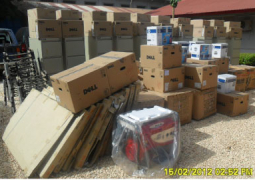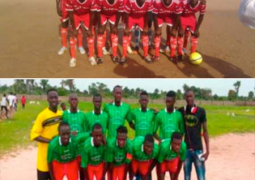It
was almost at the end of the twentieth century when the internet was introduced
to the common man; it has since then integrated in everyone’s life.
The
internet proved to be a very useful invention in a number of different ways,
and the most interesting thing that became available through internet to public
is social media.
The
birth of the social media ushered in new and innovative ways for people to get
in touch with one another. Now the use
of social media is not limited to discussing family events, and sharing photos
and videos, it can actually create history and make difference in the real
world even in developing countries like The Gambia.
Social
media has changed the way people live their lives, it is transforming politics
around the world including The Gambia.
It has got to an extent that it can be hard to imagine a world without
Facebook, WhatsApp and Twitter.
Madi
Jorbateh, programme manager at TANGO and an active social media user, said the
social media served as the most critical resource in bringing to an end the 22
years of dictatorship in The Gambia.
“After
closing the environment of freedom of expression by suppressing free speech and
muzzling the mainstream media in the country, social media became the
uncontrollable weapon in the hands of the masses,” he said.
The
social media gave many Gambians abroad the ability to create pseudo profiles on
the internet through which they provided Gambians the opportunity to access the
kind of information about Yahya Jammeh that would not have been possible
normally.
Through
the social media, Gambians create online forums to exchange ideas, mobilise
funds and people in such unprecedented ways that made it impossible for the
suppressive regime of Yahya Jammeh to control.
According
to Mr Jobarteh, social media helped in the promotion of popular participation
in Gambia’s democratic process thereby strengthening the ability of the
opposition to access and organise people.
“The
social media could therefore be said to be the source and energy that gave rise
to incredibly high level of involvement of Gambians in national affairs,” he
said.
It
was therefore not strange to see old men and women in the villages listening to
messages that people shared from various WhatsApp forums, making it possible
for the messages to be heard farther and wider.
“Most
of these messages exposed the corruption, atrocities and inconsistencies of
Jammeh and as a result, they generated popular discontent against the
Jammeh-regime in favour of the coalition,” Jobarteh explained. “This is what
therefore led to the victory of the coalition.”
For
journalist Sainey MK Marenah, there is mounting evidence to suggest that social
media sites are among the world’s foremost mechanisms for generating political
change and activism and Gambia is not an exception.
“Recently,
Gambians also took to social media sites to bring down a long time ruler and
dictator thereby paving the way for democratic change,” he said.
According
to Mr Marenah, the importance of social media to political discourse is not confined
to the activism it can generate, but it also extends to the way in which
efforts to regulate its use reflect upon the regulators themselves.
He
pointed out that the effect of social media also helped close the gap between
the opposing candidates’ media presences.
He
explained that even though the mainstream media outlets were dominated by the
incumbent’s information and propaganda in the build up and even during the 2016
presidential election of The Gambia, the opposition parties still had a voice
through the social media.
For
example, the Gambia Youth and Women’s Forum, a public Facebook group with
55,000 members, was very active in exposing the ills of the
Jammeh-administration towards the election.
“Numerous
coup attempts failed, as did diplomatic and civil society lobbying, but a
determined population supported by social media has enabled a democratic change
in West Africa’s smallest country,” Marenah asserted.
Salieu
Taal, founder of #GambiaHasDedcided movement, said even before the eventual crumbling
of the 22-year government of Jammeh, social media had gradually been serving as
catalyst for the democratisation of The Gambia since the early 90s, after Mr
Jammeh toppled the first democratically elected government of The Gambia.
Online
discussion groups, chat rooms and online platforms such as Gambianet, and
Voice-out Gambia provided medium for Gambians to connect and discuss
contentious issues in cyberspace at a time freedom speech was muzzled locally.
For
Mr Taal, Facebook provided a one-stop portal for news, real time communication
and empowered activists to rapidly disseminate news and reach out to thousands
of Gambians at a click of a button.
“It
is fair to say that through social media, Gambians became more actively
involved in the process of effecting change through the ballot box,” he said.
He
noted that his #GambiaHasDecided movement became viral thanks to the power of
social media, adding that the movement has a very active WhatsApp chat group
which was the primary medium they used to communicate with each other and
coordinate their campaigns.
The
impact of #GambiaHasDecided would not have been that enormous without the
social media.
“Social
media is the new potent tool for activism and very effective if deployed
strategically,” Mr Taal said.
Mr
Taal said with the use of social media, Gambians became more abreast with
burning issues of the country, in other words, it made Gambians to be more
politically aware and bolder.
Social
media also kept Gambia in the international spotlight and news during the
political impasse as top journalists and human rights activists were regularly
tweeting about Gambia.
News
updates during the impasse spread like wildfire through WhatsApp and Viber chat
groups.
Prior
to the launch of #GambiaHasDecided, it was unthinkable that a home-based civil
society group will take such a bold stance against Jammeh. The timing was critical as Gambians were
desolate, fed-up and looking for solutions.
With
#GambiaHasDecided, Gambians found hope; a converging point for their collective
frustration, anger and resolve to ensure Jammeh is out of power.
“This
was made possible and became global thanks to social media,” the founder of
#GambiaHasDecided said.
#GambiaHasDecided,
together with all the different activists and actors, played a critical role
during the impasse by sending a clear and unified message to Jammeh that he
lost the mandate to be president after Mr Adama Barrow was declared winner of
2016 presidential elections.
Alieu
Bah, a youth activist and social media user, said through the use of social
media by Gambians home and abroad, many people became awareness and were able
to demystify and deconstruct the fallacies of the former president.
Social
media has united Gambians for a common cause to work together towards democracy
of the country.
According
to Mr Bah, a lot of people became political aware about Gambia’s situation
online, precisely on the social media.
“A
lot of people who voted on the day of the presidential election voted for
democracy and change and the majority of them had their first awareness and
awakening on social media,” Bah said.
“Social
media play a huge role in building what we know now as the ‘new Gambia’ of
democracy, justice and truth.”
Read Other Articles In Article (Archive)
Stella Maris Parishioners in Tears
Jul 23, 2008, 7:15 AM



